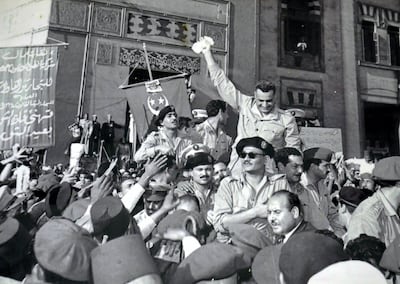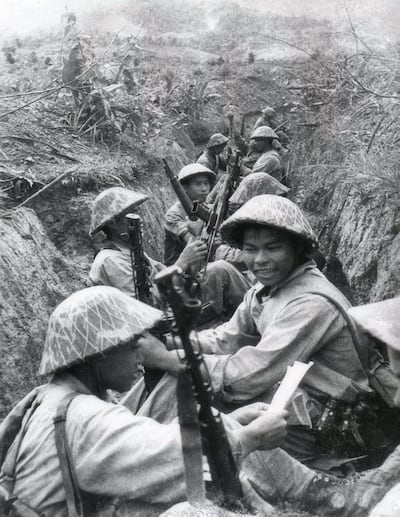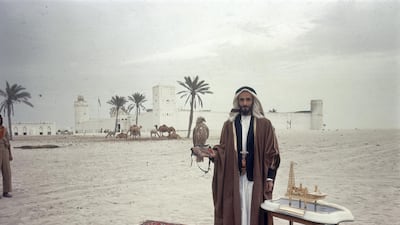The Islamic calendar takes as its starting point the Hijri, or the journey of the Prophet Mohammed and his followers from Makkah to Madinah, and consists of 12 lunar months and a year of either 354 or 355 days.
This means it moves 11 days each year in relation to the Gregorian calendar. To return to the same seasonal point as the Gregorian calendar takes 33 years.
During the course of Ramadan, The National will be looking at the world as it was on previous occasions when the holy month was in May. It is a journey that takes us back from the self-driving car to the horse and carriage, from the age of the internet to the age of empires. This week we look at Ramadan 1373, which began on May 4, 1954, and ended at sunset on June 1.
Less than 10 years after the end of the Second World War, this was a time when the world was rebuilding, but also being reshaped.
The grip of the imperial powers was slipping and nationalism, especially in the Middle East, was on the rise.
In Asia, the first battles in a conflict that would rage for the next three decades were being fought.
In Abu Dhabi, almost unnoticed by the rest of the world, the greatest transformation in its history was under way.
Culturally, a strange new tribe was beginning to emerge – the teenager, whose habits, and especially music, shocked and appalled their elders in equal measure.
And one of the most beloved and successful books of our time was published.
In 1954, in the Middle East, Gamal Abdel Nasser would rise to power, becoming prime minister in February and then the undisputed leader of Egypt after a failed assassination attempt by the Muslim Brotherhood in October.

A promoter of pan-Arab unity, Nasser’s brand of nationalism became increasingly popular with the Egyptian people, with support coming from celebrities like the singer Umm Kulthum, who married for the first time that year.
In October, Nasser signed a treaty with Britain for the withdrawal of its troops from the Suez Canal within two years, although this would not prevent the failed attempt to seize the canal by Britain and France in collusion with Israel two years later.
France’s imperial aspirations were in trouble farther east. Communist Viet Minh revolutionaries had risen up in Vietnam, a French colony since the late 19th Century.
The two sides met in the conclusive battle of Dien Bien Phu between March and May 1954, which ended in a crushing and humiliating defeat for France.
The vacuum left by France’s withdrawal would eventually be filled by the US, and the Vietnam War would lead to the death of perhaps four million people over the next 20 years.
Another consequence of France’s weakness was the start, in November, of open attacks by Algeria’s National Liberation Front against colonial rule that would soon develop into the War of Independence.

This was a year in which the divisions and hostilities of the Cold War began to solidify.
The Soviet Union formally recognised East Germany, now its satellite state, as a nation, while the US carried out several nuclear tests, including of the first thermonuclear bomb, on March 27 at Bikini Atoll in the Pacific.
The fear of Communism in the West was expressed by the US president Dwight Eisenhower in March, at a press conference in which he first explained the “domino theory” of Communist expansion from one country to the next and which would lead to US intervention across Indo-China for decades to come.
Economic and political changes were taking place in the Middle East. In January, a converted ferry, renamed Calypso by its new owner – the famed ocean explorer Jacques Cousteau – slipped into the Arabian Gulf and the waters off Abu Dhabi.
Its mission was to recover rock samples from the seabed that might indicate the presence of undersea oilfields for the newly created Abu Dhabi offshore oil concession.
Four years later, the first of Abu Dhabi’s large oil reserves was confirmed.
Abu Dhabi in 1954 was little more than a fishing village with a population of fewer than 3,000. The Ruler was Sheikh Shakhbut bin Sultan, and his brother, Sheikh Zayed – who would go on to become the Founding Father – was the Ruler’s Representative in the Eastern Region.
In Dubai, Sheikh Saeed bin Maktoum had been Ruler since 1912. It was the Crown Prince, Sheikh Rashid, who would take the first steps in the modernisation and transformation of the city, beginning with the establishment of Dubai Municipality in 1954 and the creation of a strategic plan to dredge the Creek for larger cargo ships.

These milestones in the story of what would become the UAE went largely unnoticed in the rest of the world.
While international affairs were dominated by conflict and the growing fear of nuclear war, young people were increasingly finding their voice.
In January, promoters described a concert in New York as "Rock 'n' Roll", and in April, at a studio in the same city, a group called The Comets, led by a former band leader called Bill Haley, recorded Rock Around the Clock.
A modest success on its initial release in May, the song would eventually become the first rock ’n’ roll No 1.
Also seeking to make his mark on the music scene was a 19-year-old from Tupelo, Mississippi. On July 19, Sun Records released the single That's Alright by Elvis Presley – and the rest is history.
This was also the year Texas Instruments released the first transistor radio, while in California the first Fender Stratocaster electric guitar went on sale. In May, Boeing rolled out its first passenger jet – the four-engine 707. There were concerns such a large aircraft would never be commercially viable.
The first Burger King opened – in Miami, Florida – while in Britain, food rationing imposed during the Second World War ended.
In sport, West Germany won the 1954 World Cup, defeating Hungary 3-2 in the final in Switzerland. On May 6, in Oxford, England, Roger Bannister ran the first sub-four-minute mile in 3:59.4. The current record is 3:43.13.
At the 27th Academy Awards, Fred Zinnemann picked up the Oscar for best director for From Here to Eternity, which also won best picture. The top acting awards went to William Holden and Audrey Hepburn.
Two of the most notable cinematic events of the year came from Japan, with the release of Akira Kurosawa's Seven Samurai, a film that would influence everything from The Magnificent Seven to Star Wars, and the debut, in October, of Godzilla, whose special effects included an actor in a rubber suit stamping on a scale model of Tokyo.
In July, the first part of J R R Tolkien's The Lord of the Rings, The Fellowship of the Ring, was published in London.
Fearing weak sales, the books were released as a trilogy, with Tolkien agreeing not to take an advance. The Lord of the Rings has since sold 150 million copies. Among the notable deaths of 1954 were those of the American actor Lionel Barrymore and the French author and Nobel Prize for Literature nominee known simply as Colette.
Notable births in 1954 included those of the actors John Travolta and Denzel Washington, television star Oprah Winfrey, German Chancellor Angela Merkel, former US secretary of state Condoleezza Rice, singer Elvis Costello and Turkish President Recep Tayyip Erdogan.
Oddly, 1954 goes down in history for one more reason: in 2010, the British computer scientist William Tunstall-Pedoe, who would later develop Amazon’s Alexa, said he had analysed 300 million facts with his Deep Knowledge programme to identify the most boring day in history.
Nothing of any note happened on Sunday, April 11, 1954, Mr Tunstall-Pedoe declared – except for a general election in Belgium.


